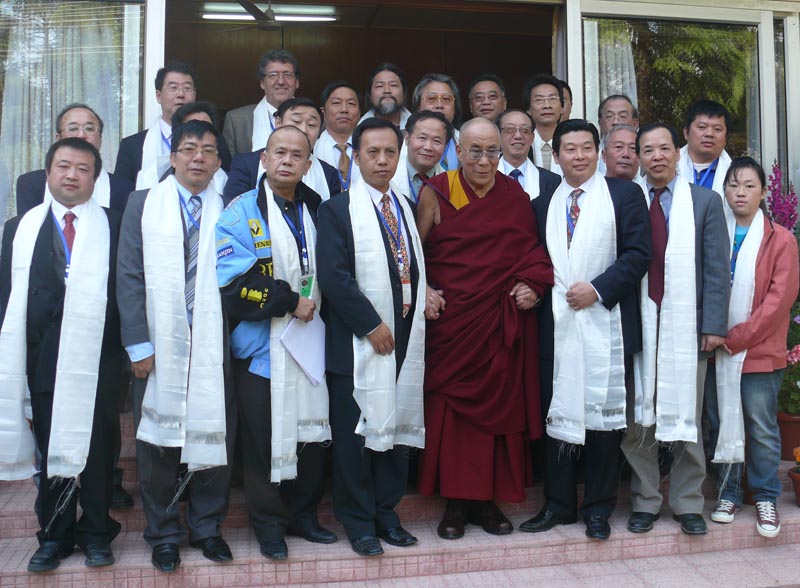 Dharamshala: His Holiness the Dalai Lama yesterday welcomed a group of 23 prominent democratic activists from around 9 countries and regions; USA, Australia, Germany, Japan, Thailand, Cambodia, New Zea-land, Taiwan and Hong Kong to a ceremony to mark Tibetan National Uprising Day, in Dharamshala, India.
Dharamshala: His Holiness the Dalai Lama yesterday welcomed a group of 23 prominent democratic activists from around 9 countries and regions; USA, Australia, Germany, Japan, Thailand, Cambodia, New Zea-land, Taiwan and Hong Kong to a ceremony to mark Tibetan National Uprising Day, in Dharamshala, India.
The group included several Chinese campaigners living in exile, who His Holiness specifically addressed, saying they had not travelled to Dharamshala out of any desire for self-gain or celebrity, but rather out of a belief in the Tibetan cause and the wish to lend support to others.
He added that Chinese people everywhere feel the Tibet issue sullies their country’s good name, so one reason to resolve it would be to restore that good name.
“Our main struggle is to preserve Tibetan culture and Buddhism,” His Holiness continued, “which could benefit 1.2 billion Chinese people.
“When I meet Chinese friends, they say 1,000 years of their culture and moral traditions were destroyed in just 60 years – that Chinese people today are materialistic and without morals, and they hope Tibetan Buddhism and culture can one day solve these problems.
“So Chinese people have many reasons to support Tibetan Buddhism and culture,” His Holiness concluded, before once again thanking the Chinese campaigners for attending.
Turning to the subject exile in India, he said that, although it is a sad situation, one positive thing is that it has enabled Tibetans to teach the world how precious their religion and culture are.
“If I was still living in the Potala in Tibet, drinking butter tea,“ he said, “I would not have had the opportunity to meet so many people and share my Buddhism and my culture.
“I am fortunate to be able to teach Buddhism in exile – so something good has come out of something bad.
“Historically, China was a Buddhist country,” His Holiness continued, “and even today it is home to many Buddhists.”
He said that Five Terrace Mountain, which is associated with the Manjusri Buddha, is in China, as is Dala Mountain, which is associated with the Avalokiteshvara Buddha.
His Holiness joked that, “Usually when I meet religious Chinese friends, I say to them, ‘You are a senior Buddhist student, and we are junior students. But junior education is no poorer than senior education!’”
He concluded by saying that the Tibet issue is not simply political, but is also concerned with Buddhism which, in turn, is about wider issues than Tibet.
“Just as rivers flow through many countries, so does Buddhism,” he said. “It is essential to take a wide perspective. We should all take heart and develop our inner energy.
“Focusing solely on the sadness of our situation in exile will not help us.”


![Tibet has a rich history as a sovereign nation until the 1950s when it was invaded by China. [Photo: File]](/images/stories/Pics-2024/March/Tibet-Nation-1940s.jpg#joomlaImage://local-images/stories/Pics-2024/March/Tibet-Nation-1940s.jpg?width=1489&height=878)















